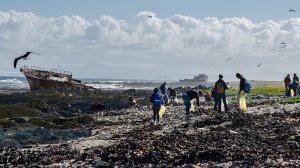Industry body Plastics|SA invites all role-players in the plastics value chain interested in cooperatively finding workable solutions to end plastic pollution in the oceans and environment to join the South African Alliance to End Plastic Pollution.
Plastics|SA says that it is essential for the plastics industry value chain to unite, and has called for industry players to join the specially formulated South African alliance to aid and possibly end plastic pollution.
South Africa’s plastic pollution problem is at risk of being sidelined in the global battle to eliminate plastic waste from the environment. “Never before has the issue of plastics pollution – and specifically plastics in our oceans – been so central,” says Plastics|SA executive director Anton Hanekom.
During the last two years in particular, global initiatives such as the New Plastics Economy Global Commitment and the Global Alliance were created with the aim of encouraging players in the plastics industry to pledge their commitment to reducing plastic pollution in the oceans.
“While these efforts are commendable, they fail to address the South African problem directly. “We have our own, unique challenges in waste management infrastructure, education and awareness that must be addressed,” says Hanekom.
He adds that the country does not have the luxury of time to wait for these international alliances to shift their focus onto South Africa.
South African companies need to develop a workable, local plan and South Africa needs to do so now, he asserts. Such a plan needs to be aligned with international initiatives, but should find innovative solutions that fit the South African context and the environmental and socioeconomic realities.
The South African Alliance to End Plastic Pollution is a united group of all role-players in the local plastics value chain that will collaborate to prevent and ultimately end plastic pollution in the environment.
Plastics|SA’s first priority will be tackling problematic “single use” packaging by finding solutions and developing the best environmentally sustainable applications. South Africa also urgently needs to increase the plastics recycling rates and make more products available with increased recycled content.
Hanekom maintains that sustainable life-cycle assessments must form the basis for these and other solutions. “To achieve this, the environment will require much more access to research facilities and the technological landscape, together with the critical involvement of our government, businesses, nongovernmental organisations, existing environmental and community networks, as well as the country’s citizens.”
The development of a focused, collaborative local South African Alliance to End Plastic Pollution is therefore under way and, he says, must be expedited to make immediate impacts while remaining cognisant of external factors – like the New Plastics Economy Global Commitment 2025 and the National Development Plan 2030 – together with the objectives and roll-out of the proposed Packaging and Paper Industry Waste Management Plan.
Further, existing projects such as the home-grown, mobile recycling alternative to separation at source, Packa-Ching, would be useful, interim initiatives to deal with the lack of waste management infrastructure.
“South Africa cannot solve the exploding problem of plastic pollution in the environment without all members of the plastics value chain constructively finding and implementing effective and environment-friendly solutions for our specific waste problems for more effective and greater change. “There’s no time left to waste,” concludes Hanekom.
Edited by: Zandile Mavuso
Creamer Media Senior Deputy Editor: Features
EMAIL THIS ARTICLE SAVE THIS ARTICLE
ARTICLE ENQUIRY
To subscribe email subscriptions@creamermedia.co.za or click here
To advertise email advertising@creamermedia.co.za or click here













